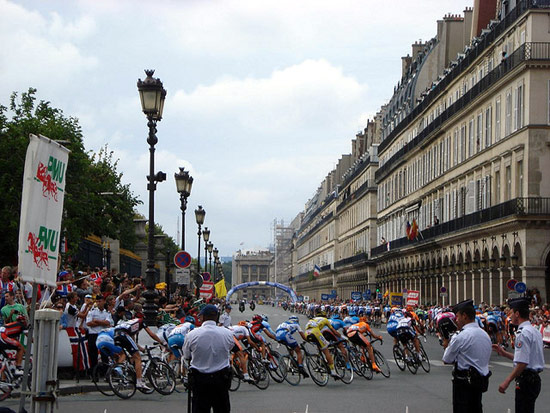Culture and Society: Greetings and Courtesies
General
France’s literary heritage inspires its people to take pride in the elegance of their language. This, combined with a customary sense of ceremony, an awareness of social status, and a distinction between private and public life means that formal greetings and courtesies are widely observed.
Informal Greetings
French men greet male friends and family members with se serrer la main (a single, light shake of the hand), while towards women they perform faire la bise (two to three kisses on the cheeks). Women also greet one another with kisses on the cheeks. When being introduced to a large group, French people shake hands or kiss everyone at the start of the engagement, and do it all over again when it’s time to depart.
In informal settings, the French use each other’s first names and the informal tu (you). When greeting a friend, a French person might say Salut (Hi), followed by, Comment vas-tu? (How are you?) or, Ça va? (How goes it?), to which someone might respond, Ça va bien (It goes well). In an informal context, a French person commonly introduces him- or herself with Je suis ___ (I am ___), and asks someone else's identity with, Comment t'appelles-tu? (What's your name?). After meeting someone, it's considered polite to comment, Content/Contente de te rencontrer (Pleased to meet you), speaking as a male or female, respectively.
When taking leave of a friend, the French most often say, Au revoir (Goodbye) or, more colloquially, Bientôt (Soon) or, borrowed from Italian, Ciao (Bye).
Formal Greetings
Formal greetings in France apply to anyone who is not a friend or family member. Formal greetings tend to be restricted to handshakes only, and a man is compelled to wait for a woman to extend her hand first. However, during formal introductions within a large group of people, this custom isn’t always observed.
French people in a formal situation address each other as vous (you) and as Monsieur (Sir), Madame (Madam), or Madamoiselle (Miss), followed by the last name. The most common greeting is Bonjour (Good day), said not only to officials and social superiors, but to shopkeepers, waiters, and anyone else one might meet, but whom one doesn’t know personally. Later on in the day, one can say Bonsoir (Good evening, used to mean both "Hello" and "Goodbye").
To politely enquire after someone's well-being, a French person might ask Comment-allez vous? (How are you?), to which the common response is, Très bien, merci (Very well, thank you). One makes a formal self-introduction by saying, Je me présente (Let me present myself), followed by one’s name, to which someone else may say Enchanté (Enchanted).
There are numerous ways of formally bidding farewell in France. When leaving a social engagement, it is customary to say Au revoir (goodbye) to each Monsieur, Madame, or Madamoiselle. A shopkeeper may say Bonne journée (Good journey) to a customer. If a French person is unlikely to see someone for a long time, he or she might use the slightly archaic term, Adieu (God be with you).
Business Greetings
Business greetings broadly adhere to the same imperatives as formal greetings, although professional titles such as Docteur (Doctor or Ph.D.) or Professeur (Professor) are more likely to be used. Common business titles include Président (President), Directeur (Director), Directeur Général (General Director), Chef de bureau (Office Manager/Chief), and Sécretaire (Secretary).
It's customary to exchange business cards after being introduced. The French include advanced academic degrees and business titles on their business cards, and foreigners are expected to translate their cards into French.
Conversation Topics
The French love to talk in depth and passionately about all kinds of subjects. They are typically unafraid to express emotions and strong opinions, even in formal situations. One consequence of this is that there’s rarely a moment of silence, with raconteurs talking over another to make an important point. This is never construed as rude in France, but rather a welcome demonstration of one’s interest. Acceptable topics of conversation include sport (especially the Tour de France cycling race, tennis, and soccer), the merits of Gallic cuisine, French and international music, as well as more high-brow subjects such as art, philosophy, literature, and politics. France’s excellent public education system and significant contribution to the history of ideas has produced a well-informed, articulate, and thoughtful citizenry. The French tend to respect anyone with a good knowledge of French national politics and history, especially foreigners.
Taboos
In polite conversation, it is poor form to ask someone what his or her exact political affiliations are, or which way he or she voted in the previous election. These are considered private matters. The French tend to revere Napoleon for helping define the national identity, so criticisms of him are usually unwelcome.
When meeting and greeting, using someone’s first name before being invited to do so can cause offence and mark one as uncouth.
On the rare occasions when business gifts are given, those that bear corporate logos are deemed to be an impolite intrusion of the professional on the personal.
French people don’t normally like to discuss income or material possessions, regarding such topics as distasteful and boastful. While French society holds status dear, those who name-drop famous friends and contacts are typically considered arrogant.
Article written for World Trade Press by Tom Sykes.
Copyright © 1993—2025 World Trade Press. All rights reserved.

 France
France 
